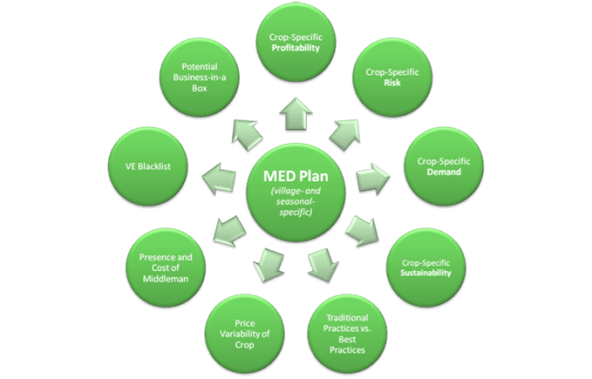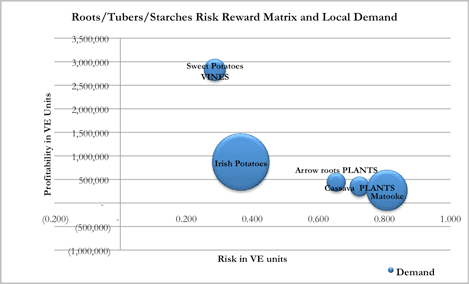Jerry Kaplan—American serial entrepreneur, executive, technical innovator, and author—says the five biggest mistakes that entrepreneurs make are having unclear goals and an unclear mission, trying to prove that they are smart, becoming greedy, hiring people they like (rather than people they need), and not knowing when to let go. I agree! But I would add one more. I live in an environment where lack of information is a driver of entrepreneurial failure. And good information can drive success.
I work for Village Enterprise, a nonprofit microenterprise development organization in East Africa. Village Enterprise is like an angel investor for entrepreneurs living in extreme poverty. Because we provide grants rather than loans, we do not receive a financial return, but we do fund more than 2,000 new businesses a year and provide training and mentoring to over 6,000 entrepreneurs during one-year periods.
As you can imagine, the profile of our entrepreneurs is dramatically different from those in the United States. Our business owners are completely committed to their once-in-a-lifetime opportunity to start a business. As a result, they are also extremely risk-averse. Not earning an income affects very important life factors: you cannot take your children to the doctor, pay their school fees, or feed your family. Therefore, the choice of a business is tremendously influenced by fear of failure. Until recently, Village Enterprise’s business owners relied on past experiences and anecdotal decision-making processes to launch their businesses. The majority of these businesses are agriculture-related. I’ll give you three examples.
Knowing demand: Five years ago, one of our business owners, Ugandan farmer Hellen Akapumuza, decided to launch a beekeeping business in Soroti, Uganda. Although there was anecdotal evidence that beekeeping was a profitable business, there was not enough local demand to absorb her production. So her honey was no longer worth collecting, other than for family consumption.
Are you enjoying this article? Read more like this, plus SSIR's full archive of content, when you subscribe.
Timing the market: Four years later, over 30 business owners in Kakamega, Kenya were given the training and opportunity to launch their maize retail ventures. Unlike Akapumuza, they did consider the high demand for and profitability of their product—but by the time they purchased their inventory and set up their retail stands, maize harvesting season was in full force, prices dropped, and they sold their maize at a loss.
Understanding sustainability: We are now seeing a number of well-funded NGOs starting complex agricultural value chain efforts to help farmers grow profitable crops at the optimal time of year, even linking them with national and international demand. Some of these organizations create a dependency cycle for farmers, however, who are then unable to become self-sustaining. Once the farmers factor in their own consumption while waiting for the harvest season, and receive the anticipated profits minus any debt they might owe, they soon realize that their profits are not sufficient to purchase next year’s inputs of seeds, fertilizer, storage bags, and post-harvest pesticide. Farmers must request loans year after year just to continue their businesses.
 Output for Village Enterprise MED tool.
Output for Village Enterprise MED tool.
As a result of these challenges—and many others we have experienced while helping to start 25,000 businesses—Village Enterprises has created a micro-enterprise development (MED) tool to guide entrepreneurs living in extreme poverty in the business start-up process. The MED tool is based on a collection of agricultural best practices, combined with local information regarding current and historical market prices, crop seasonality, local demand, and availability of inputs and outputs. Additionally, Village Enterprise collects crop-specific, pre- and post-harvest risk information, such as theft, perishability, pests, diseases, and weather vulnerability in each season and region where Village Enterprise operates. This information allows business owners to effectively benchmark risk profiles of crops. We also have created a sustainability index that allows farmers to understand the likelihood of purchasing next year’s inputs with this year’s profits.
 MED results from the Eldoret region, Kenya, June 2012.
MED results from the Eldoret region, Kenya, June 2012.
Although the MED tool was developed just a year ago, it is already having tremendous impact. Western Kenya is sugarcane territory, where large companies will plow, plant, and harvest sugarcane from a farmer’s land at no initial cost. Twelve to 18 months later, farmers receive a small portion of the profits. Needless to say, this practice is not satisfactory, and farmers cannot afford to purchase the inputs for the following season. Upon receiving Village Enterprise’s training and MED results, farmers in the area have begun to uproot sugarcane and plant significantly more profitable and sustainable crops.
As you can imagine in an environment where the Internet is virtually unknown, access to accurate, timely information is a critical factor in an entrepreneur’s success. It is fascinating and rewarding to see how the understanding of factors—such as demand, profitability, price fluctuation, risk, and sustainability—is having a life-changing impact on farmers in East Africa. Good, timely information is indeed a key to entrepreneurial success.
Support SSIR’s coverage of cross-sector solutions to global challenges.
Help us further the reach of innovative ideas. Donate today.
Read more stories by Konstantin Zvereff.

